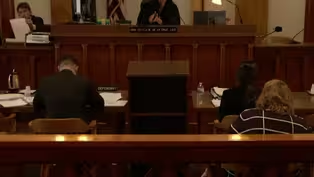NJ Spotlight News
NJ mandates postpartum care plans for all pregnancies
Clip: 11/21/2024 | 5m 2sVideo has Closed Captions
Maternal health providers must make postpartum plan early in pregnancy
Gov. Phil Murphy on Monday signed into law a bill that requires maternal health providers to create a postpartum plan with every expectant patient during the early part of their pregnancy. Data shows it’s in the early weeks after a baby is born that mothers are likely to experience life-threatening complications, even death.
Problems playing video? | Closed Captioning Feedback
Problems playing video? | Closed Captioning Feedback
NJ Spotlight News is a local public television program presented by THIRTEEN PBS
NJ Spotlight News
NJ mandates postpartum care plans for all pregnancies
Clip: 11/21/2024 | 5m 2sVideo has Closed Captions
Gov. Phil Murphy on Monday signed into law a bill that requires maternal health providers to create a postpartum plan with every expectant patient during the early part of their pregnancy. Data shows it’s in the early weeks after a baby is born that mothers are likely to experience life-threatening complications, even death.
Problems playing video? | Closed Captioning Feedback
How to Watch NJ Spotlight News
NJ Spotlight News is available to stream on pbs.org and the free PBS App, available on iPhone, Apple TV, Android TV, Android smartphones, Amazon Fire TV, Amazon Fire Tablet, Roku, Samsung Smart TV, and Vizio.
Providing Support for PBS.org
Learn Moreabout PBS online sponsorshipIt could get easier to raise a baby here in Jersey.
That's because on Monday, Governor Murphy signed a bill that will require pregnant patients to receive personalized postpartum care plans as part of prenatal care.
The bipartisan legislation is in an effort to reduce preventable maternal mortality and enhance women's overall health, especially for women of color, according to a state report on maternal mortality.
Black women are nearly seven times more likely to die while pregnant, giving birth or in the postpartum period that follows compared to white mothers.
Senior correspondent Joanna Gagis has more on the bill that would help moms reach care even after the end of pregnancy.
It looks like just based on this bill they're looking at, you know, this, the mother and the family from a more holistic perspective, that Bill 912 was just signed into law by Governor Murphy on Monday requiring maternal health providers create a postpartum plan with every patient who's expecting a baby during the early part of their pregnancy.
Data shows it's in those early weeks, right after babies born, the mom is most likely to experience life threatening complications, even death an issue the state's been working to reverse.
There are some times where, even though everything went completely normal and really been delivery there, sometimes when things can go awry postpartum.
The bill, which had bipartisan support, would first establish a care team for the patient, including pre-scheduled follow up appointments, breastfeeding guidance, a plan for postpartum contraception, information about any pregnancy complications that patients experienced, along with signs and symptoms of any mental health concerns that may arise postpartum.
Other options include pelvic floor support or any other physical or mental health needs that may arise.
The bill is designed so that people have a plan in place before they leave the hospital, the birthing center, wherever they've delivered, so that when they get home and they have that baby and questions arise, they have tools and they have a plan in place to know what to do.
Maternal health providers say a critical piece of creating a care team is identifying people at home who will be helping to monitor the mom in those early days after delivery to help identify any concerns.
Too often, it's in those early weeks when signs and symptoms are missed.
We can tell patients, you know, to look out for certain signs and symptoms, but you know, the folks who are surrounding them on a day to day basis are probably more poised to see changes or to recognize, you know, signs and symptoms.
I think this bill kind of simplifies, like all the other outside factors that impact how people receive postpartum care.
So structuring it this way is a good start.
But I think there are still a lot of other issues that really impact access that needs to be addressed as well.
Doctor Natasha Harris says chief among them is the trust that needs to develop between patients and providers to make the plan effective.
And that's been a problem reported by many moms of color in new Jersey, who also have the highest death rates.
So we're putting it back on the onus of the organizations where there hasn't been a great relationship to begin with.
To center what should happen in the postpartum period?
What we know is that there's a large number of black women who experience disrespectful care over the course of their pregnancy, and so they're not returning to have this conversation.
Harris also wants to see more community organizations included in the postpartum care teams to bring more equity to underserved communities.
But even for those who do intend to keep their follow up appointments, the timeline in new Jersey right now is six weeks postpartum.
Do you think that we need to see legislation that requires an earlier office visit for postpartum moms?
Yeah.
So I would say that is the the recommendation from Acog is not a six week visit, but a three week visit.
And so I've seen some change in that is a little inconsistent with how many people actually get that that three week visit.
But also there there has to have been a good relationship prior to that three week visit.
ACOG is the American College of Obstetrics and Gynecology.
Latina artists with care.
Plus, new Jersey thinks the very act of creating this plan together will help build trust between providers and patients.
Is there actually taking a genuine interest?
You know, how these mothers and families are actually doing.
The state hasn't released any new maternal health data since 2018, so it's hard to measure what changes are actually having any impact.
For NJ Spotlight News, I'm Joanna Gagis
DOJ finds pattern of misconduct by Trenton police
Video has Closed Captions
Clip: 11/21/2024 | 1m 15s | Results of yearlong investigation were released Thursday (1m 15s)
End mandatory minimum sentences in nonviolent drug cases?
Video has Closed Captions
Clip: 11/21/2024 | 4m 59s | NJ commission also recommends other sentencing reforms (4m 59s)
Murphy delivers keynote at League of Municipalities
Video has Closed Captions
Clip: 11/21/2024 | 1m 34s | The governor's speech focused on economic growth and affordability (1m 34s)
What to know as ‘walking pneumonia’ spreads
Video has Closed Captions
Clip: 11/21/2024 | 5m 19s | Interview: Epidemiologist Stephanie Silvera, Montclair State University (5m 19s)
World Cup's challenges and opportunities for NJ
Video has Closed Captions
Clip: 11/21/2024 | 4m 56s | State's first men's World Cup since 1994 expected to bring in big tourism (4m 56s)
Providing Support for PBS.org
Learn Moreabout PBS online sponsorship
- News and Public Affairs

Top journalists deliver compelling original analysis of the hour's headlines.

- News and Public Affairs

FRONTLINE is investigative journalism that questions, explains and changes our world.












Support for PBS provided by:
NJ Spotlight News is a local public television program presented by THIRTEEN PBS




